Casey Stoney
Manchester United Women, 2018-2021
I heard a rumour that Manchester United were starting a women’s team.
It was obviously something the women’s game had wanted for a long time. I spoke to Phil Neville, who I was working for as part of the England Women coaching team. He confirmed that it was definitely happening. I asked if he minded me putting my name in the hat for the job.
I managed to get my CV in, and had to go to Old Trafford. There, I delivered a presentation on what I would do in my first 30 days in the job. How I would build a team, what my philosophy would be, how I would structure the staff. The team simply didn’t exist, so we knew we would have to build it from the start.
I’d heard rumours of lots of high-calibre coaches and managers going for the job. If I’m honest, I didn’t think for one second that I would actually get it. I just wanted to go through the experience of the interview, the process. I was actually with Phil again, doing some TV work, when I found out. He came into the green room and said: “I think you’ve got the job.”
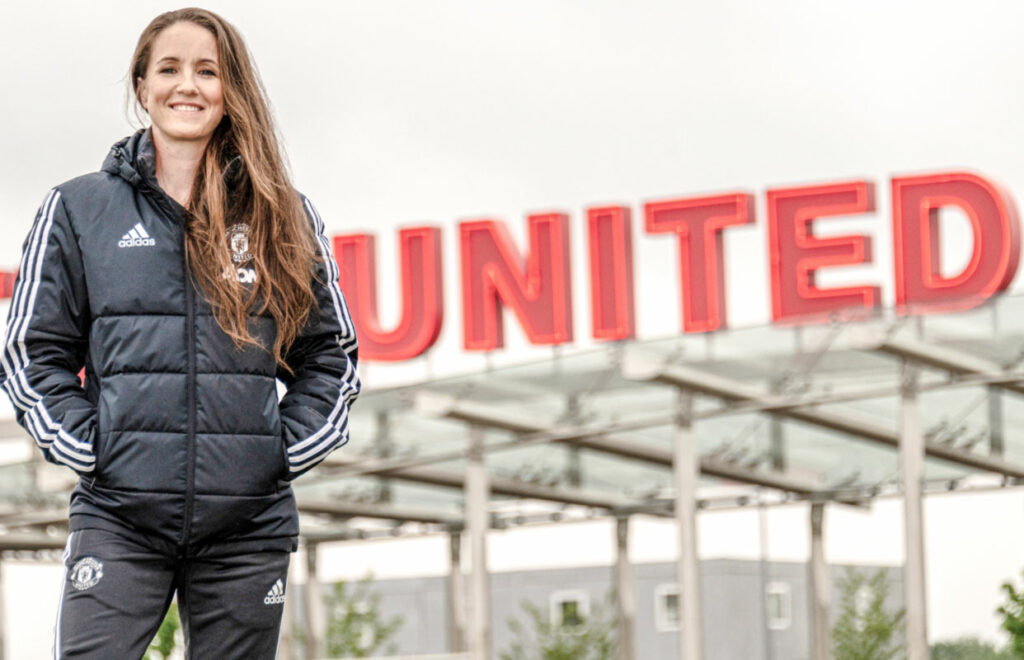
Soon after, I took a call from John Murtough, who is now director of football at the club. “We’d like you to come in and have another chat,” he said. I went to the training ground, and they told me I had the job.
From the moment Phil had said it, I was already planning. How am I going to do this? What staff do I need? Who am I going to sign? I had four weeks to build an entire team.
There was a steep learning curve ahead of me, but it wasn’t the first one I had faced in my coaching career.
"I went into one England camp as a player and returned for the next one as assistant coach"
Back in 2009, I was playing for Chelsea when I received a phone call from the club’s press officer, who kind of acted as our chairman. The manager at the time had parted company with the club. We had no other coaches, no goalkeeping coach and barely a physio. The call came on a Friday night; we were playing Lincoln in a cup game the following day.
“You’re taking over.”
It wasn’t a choice.
I felt a huge responsibility to make sure the team was prepared, and we had some big players in the team at that point: Lianne Sanderson, Anita Asante, Eni Aluko. I was captain of the team, but the first thing I did was give the captaincy to someone else. It was an extra responsibility I didn’t need at the time.
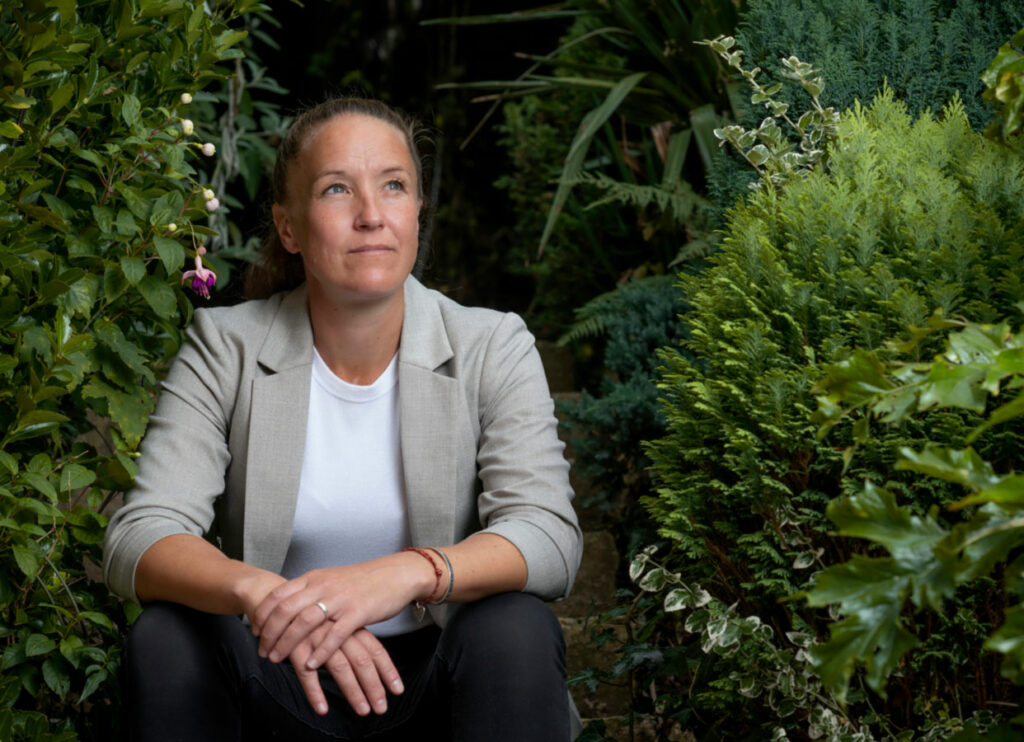
The most difficult part was trying to coach a team when you’re in it. How can you coach a back four to defend crosses, for example, when you’re actually in it? It’s difficult enough when you have the resources, but we had nothing. We didn’t even really have a kit.
That time was a huge learning curve for me, but it made me think outside the box, become more resourceful and be more creative with session design. I also had to learn how to get information across to players who had been teammates the week before. It’s an experience I really value as an important early part of my coaching journey.
My short stint with England was also fascinating. I went into one camp as a player and returned for the next one as an assistant coach. The big positive I took from that was when one player said to me: “It’s like you’ve always been in this role.”
I’d been the England captain, but as a squad member in those later years I had almost removed myself from thinking about playing. The move into the coaching staff felt like a natural process. Being an assistant to Phil helped me determine what I would need from my assistants when I eventually moved into management.
"The club spoke about building slowly, but that wasn't for me"
I also realised that I needed to be in a club. I wanted to be on the grass, around players, and I needed the day-to-day that you don’t get from the international game. International camps are about preparing for and trying to win games. You can’t develop players in the same way, and developing players is something I love to do.
At Manchester United, I had to find them first.
I wanted to sign players I trusted, and I was extremely privileged that there were players who trusted me and the club enough to drop down a level and play in the Championship. Alex Greenwood (below), Amy Turner and Siobhan Chamberlain all came to play for me, having been in the Super League. They took a big risk doing that, but they would also be history-makers as part of the first Manchester United Women's team – and we set big expectations from the very start.
The club had said there was no pressure to get promoted in our first season. They spoke of building slowly, a crawl-walk-run strategy, but that wasn’t for me. We wanted to build a team not just to get promoted, but to win the league. We spoke about the Champions League as a target from the very start.
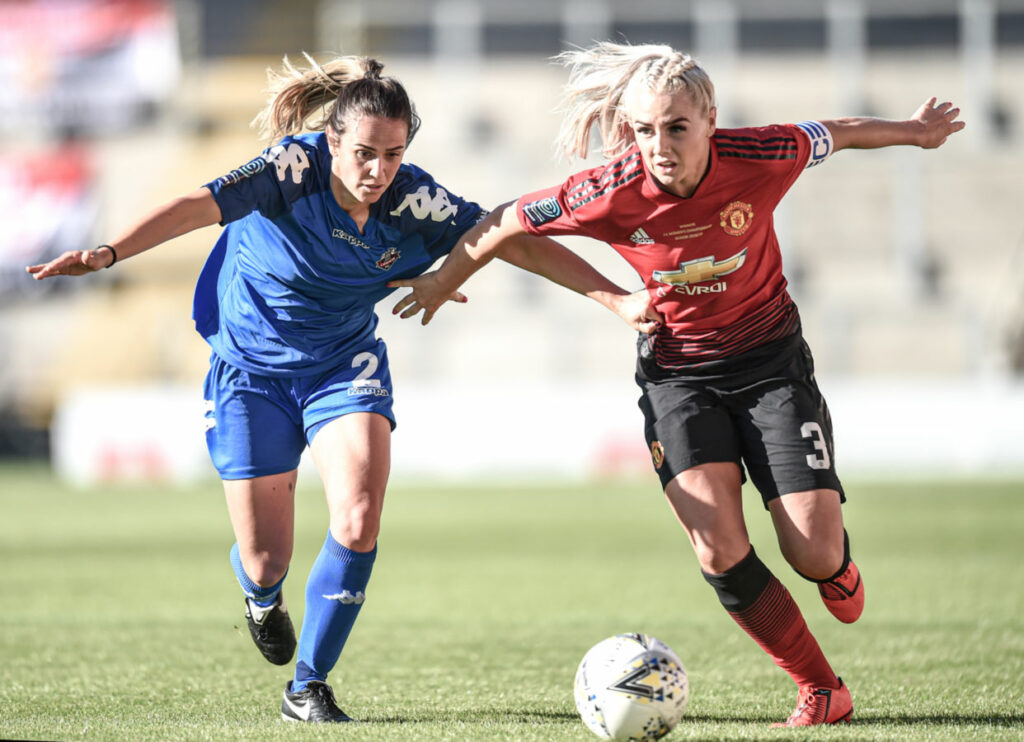
I also saw huge potential to change the face of women’s football. Everyone knows Manchester United is a big club. It’s only when you actually get inside it, though, that you realise quite how massive it really is. I thought about the following we could build if we did well, and what that could do for women’s football. Yes, the badge comes with pressure and expectation, but I’ve always felt that I work better under pressure. This was the perfect opportunity.
In our first league game, we beat Aston Villa 12-0. We were sloppy for the first 20 minutes, and then again for the last 20 minutes. I said to the players: “Imagine what we could have done if we’d performed for 90 minutes rather than 50.”
I couldn’t really complain, I suppose, but that result put a massive target on their backs in that division. We knew they had to face sterner tests and we wanted to prepare them for what would lie ahead. As such, we learned a lot from our run to the semi finals of the Women’s League Cup.
"You need to feel comfortable being uncomfortable"
We lost 2-0 at home to Reading in our first group fixture, in front of nearly 5,000 fans. We created chances, though and were quite unlucky against an established WSL team. To eventually top a group that also had Liverpool and Everton in it gave us the belief that we could play Super League football. Then, to go and play so well against Arsenal – one of the best teams in the country – in a semi final we only lost 2-1 really put down a marker.
It also enabled me to see where I thought we were still short, and where we needed to recruit if we really wanted to compete when we went up. I didn’t just want to participate in the WSL – I wanted to go up and really compete in our first year. That defeat to Arsenal showed the players the levels we needed to be at.
We needed a bit more quality at the back in terms of playing out, and we definitely needed more legs in midfield. By January, we knew were going to get Jackie Groenen, and then we went out and got Hayley Ladd (below) – who is one of the very best at stifling the opposition in midfield. I was confident that we would score goals, but we had young forwards and I wanted a forward with a bit more experience – so we recruited Jane Ross, who was fantastic on and off the pitch. We wanted people in the dressing room who could drive standards. It’s not just about talent; it’s about character too.
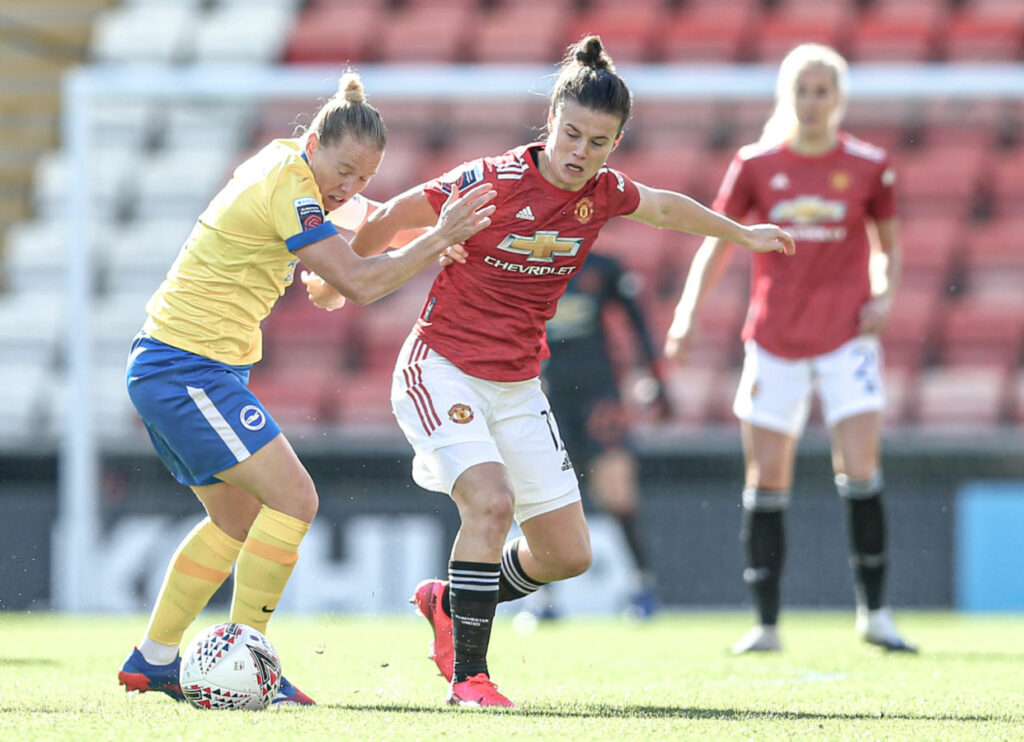
From day one, I wanted to do one thing a month where we put the ball away and did something as a team that stretched our comfort levels. We did ninja, sumo wrestling, water yoga, high-wiring… we did so many things, but it was about bringing a relative group of strangers together as one. How quickly we could connect, how quickly we could build a cohesive unit, was really important.
I also wanted everybody to share their journeys, and I started that process. I wanted them to know who they were playing for; if I was prepared to stand up and be vulnerable in front of them, they could do the same. And I always said I would never make them do anything I wouldn’t do myself – like street dancing, which is basically my worst nightmare. We also had someone come in with snakes and spiders – I can’t stand spiders, at all, so it was a case of facing our fears together.
Some things make us feel uncomfortable, but if you’re going to go and win a Champions League or a league title, there are going to be uncomfortable moments. You need to feel comfortable being uncomfortable.
"We had an inkling that Tobin Heath and Christen Press wanted to come over – I got on a call and the deal was done"
For our first season in the WSL, the league was really kind to us: Man City at the Etihad first game, Arsenal at home in the second. That was a tough, tough test.
We lost 1-0 at the Etihad (below), but we dominated periods of the game and had our chances. Their keeper made a great save early on, and I think if we had gone one up we could have really grown into the game. But the performance gave the team the belief that they belonged in the Super League, and then although Arsenal dominated the next game we defended brilliantly and only lost it in the 89th minute. We needed that first win, and when we got that against Liverpool you could see the team grow in confidence and belief.
We went on a bit of a run after that, but then Covid struck – and that was tough. Reading pulled out of a friendly we had scheduled, saying they were shutting their training ground, and then two days later the club told us we were shutting down too. We literally dropped everything and left.
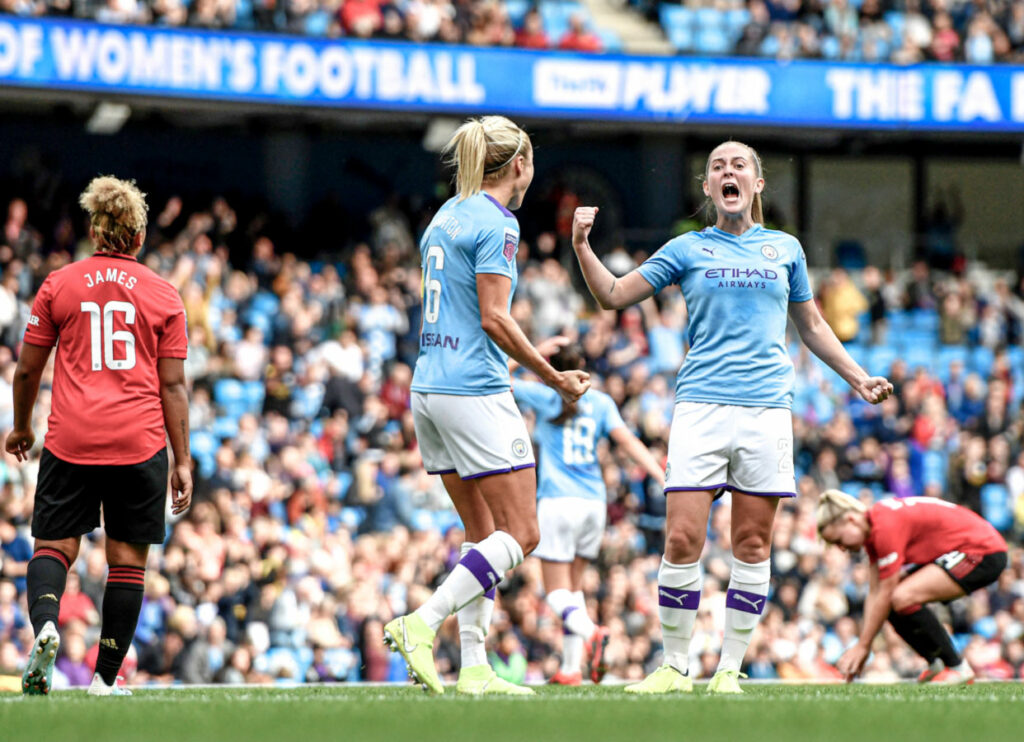
The hardest part was not knowing when we would be back, because the goalposts kept moving. But then you watch the news and realise that football just wasn’t important. The most important thing was to make sure my players and staff were both safe and connected. Some of our players lived on their own, no family, no friends, couldn’t get out or do anything.
We put processes in place to make sure everyone was supported: zoom calls, cooking competitions, little technical tasks. We set up a buddy system that changed every week, so people were checking in with different players or staff, and we made sure we got equipment out to everybody, too. These are athletes who are used to training. Strip everything away, and they’re going to struggle.
I was disappointed the season was ultimately cancelled, of course, but it was the right thing to do. I know the Premier League eventually continued, but in the women’s game you just couldn’t justify spending that much money to finish a campaign. It was much better off being invested in ensuring everything was up and ready to go for the next season.
"I'm extremely proud of what my staff, players and I built at Manchester United"
We had an inkling, ahead of it, that Tobin Heath and Christen Press (both below) wanted to come across and play in England. I got on a call with them and the deal was done, although it was quite late and they weren’t available straight away. When you bring American players into your dressing room, though, what you get is an unbelievable mentality. They know how to win, they are unbelievably competitive, and Tobin and Christen added that from the off.
We had to take a bit of time with them – they hadn’t been in a team environment for a while, so we had to make sure we managed them properly, got them fit and kept them fit – but they were great additions. I knew that, even if they were only with us for a season, they would leave a lasting impact. The influence they had on the younger players, in terms of mentality and competitiveness, will carry through into the next part of those players’ careers.
By the halfway point of the 2020/21 season, we were top of the WSL table. You don’t win a game after 45 minutes, though, and I’m not one to get carried away. We had enjoyed some excellent results – we were convincing against Arsenal and deserved the points – but Manchester City could have battered us in the first half of a 2-2 draw in the next game. In the end, we did well to get a point.
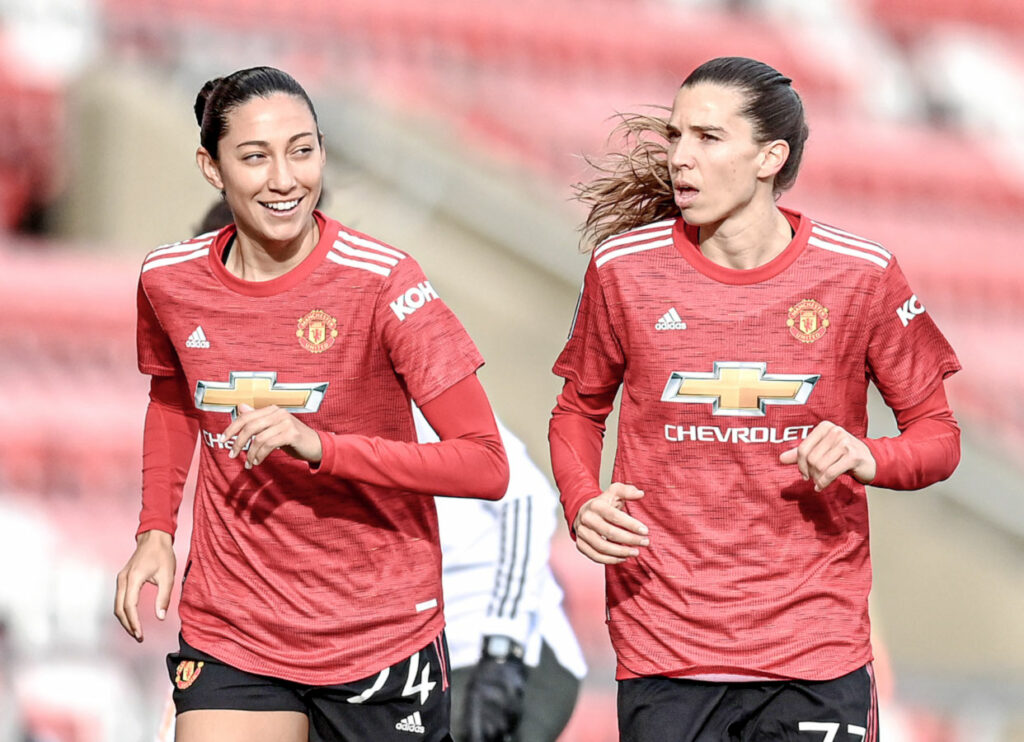
I’m ambitious, but I’m also a realist. All I said to the players was that we had put ourselves in a good position to get Champions League football.
Unfortunately, injuries crucified us at a really crucial time. Our preparation for some games could have been better, in terms of having to move venues and not being able to train on certain pitches. That did have an impact, but I won’t make excuses. We lost against Brighton when we shouldn’t have, we lost against Reading when we shouldn’t have. In the end, those defeats cost us the Champions League spot we wanted.
"Moving to San Diego is a life-changing decision for my family and I, but it's also very exciting"
I left the club at the end of that season. The learning curve was steep, again, but I needed it and I will never stop learning. I want to be better all the time, but I’m also extremely proud of what my staff, my players and I built there.
Let’s not forget that, in May 2018, there was no team. Now, the club has a competitive team fighting to get in the top three. There is a really good foundation there; I really hope the club now take it to the next level.
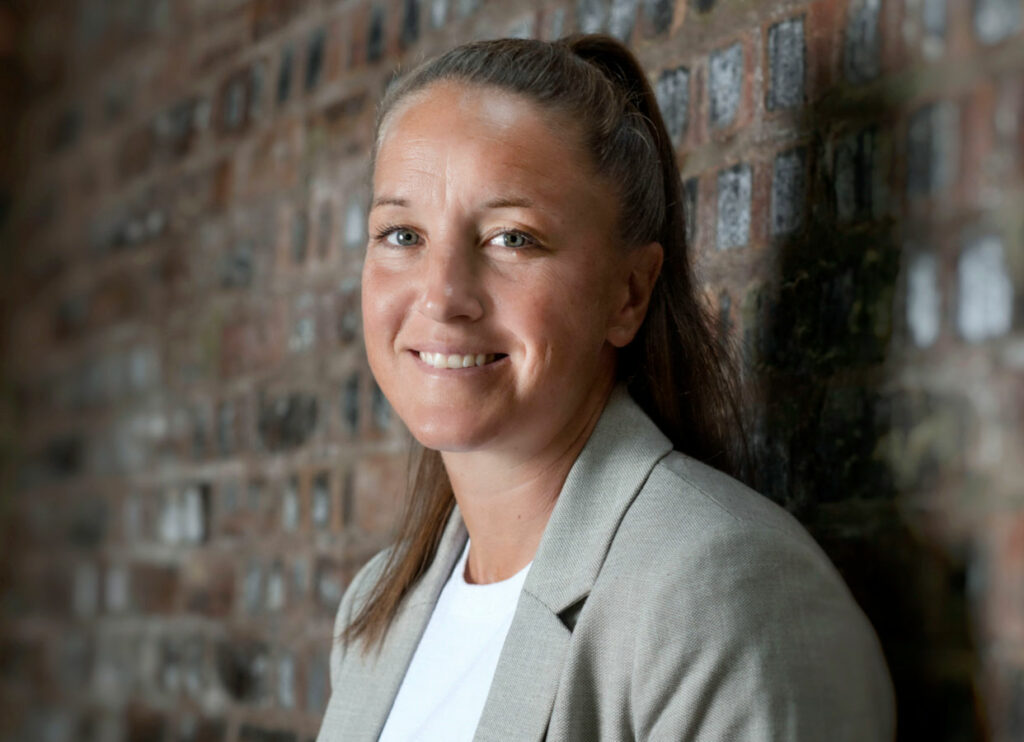
As for me, I couldn’t be more excited about the challenge ahead with San Diego Wave. A new league, a new culture, expansion drafts, college drafts, different rules and regulations. It’s going to really challenge me, but that’s what I want. I want to be successful, and going to San Diego means I’m working for someone who knows what success is.
Jill Ellis has won back-to-back World Cups with the USA. She’s been there, seen it, done it. I’ve never had someone above me like that, whose knowledge and experience I can tap into.
It’s a life-changing decision not just for me, but for my family too. But it’s also a very exciting one. The NWSL is one of the most competitive leagues in women’s football, if not the most. You literally never know who’s going to win a game, and I like that excitement. My learning curve continues, but I can’t wait to get going and hopefully put my stamp on another new team.

Casey Stoney


